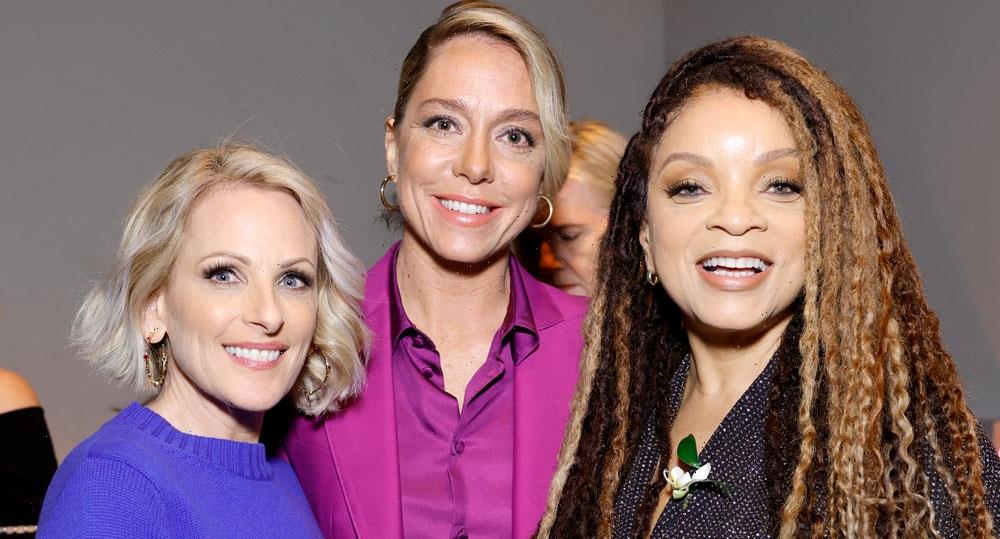
Marlee Matlin, Siân Heder and Cathy Schulman Toast in Hopes for Historic Wins at Women in Film Oscar Party
03/12/2023Approximately 30 of the women nominated for this year’s Oscars joined Women in Film (WIF) for their 16th annual celebration to accept their salute from their peers and fellow trailblazers.
The event, held at Neuehouse in Hollywood, was hosted by Oscar winners Marlee Matlin, Siân Heder and Cathy Schulman, all women who know what it’s like to be the “first” to cross the finish line.
“Being the first is a significant moment for the advancement in equality, as several of this year’s nominees know well,” said Matlin – who, in 1987, became the first deaf actor to win an Academy Award and is still the youngest best actress winner in history – saluting WIF as the “first organization founded by a group of women who want to make a difference for gender equality in Hollywood.”
She continued: “The work that Women In Film and all the advocates for equality do is so important because one day we want to stop celebrating firsts. Women, people with disabilities, queer people have been here all along and we’re more than ready to be recognized equally by our peers.”
Alternately, Heder, whose film “CODA” won the best picture prize at last year’s ceremony, saluted the women whose films were overlooked by the Academy, explaining why she’s still optimistic about things moving forward.
“There’s a kind of camaraderie that’s happening with women filmmakers right now,” she explained. “I feel like the louder we are for each other, the more that we can amplify each other’s voices, support each other’s stories, shout about each other’s movies – that’s how we move this forward.”
There are a few women who might make history at tonight’s awards – including Michelle Yeoh, who’d become the first woman who identifies as Asian to win best actress and just the second woman of color, following Halle Berry in 2002, or Ruth E. Carter, who could become the first Black woman to win two Oscars, ever. But the loudest applause came for “Elvis” cinematographer Mandy Walker, who is just the third woman to be nominated in the category and considered likely to win.
“No matter what happens on Sunday, I’m having a great time,” Walker told Variety, saying she’s been relishing her experience as a first-time nominee and sharing the ride with the women of “Elvis” who are also nominated, including producer/costume designer/production designer Catherine Martin and producer Gail Berman.
Asked if she had any lucky charms or talismans on hand for Sunday’s ceremony, Walker noted that her husband has a “lucky rock that he’s going to put in my purse.” She explained: “Hopefully that just gives me a little extra boost, at least might be feel good.”
Walker already made history, as the first woman to take top honors at the American Society of Cinematographers Awards, dedicating her trophy to “all the women who will win the award after me.” She said: “This is an inclusive representative community. Let us all strive for success and show our mission and create art.”
In some ways, Walker’s remarks veoked Berry’s teary acceptance speech at the Oscars. But how does the industry ensure, if Walker wins, that there’s not a similar 20-year gap between her and the next woman?
“It’s about being aware and being really conscious, so we get more women into my department and that is with training and giving people opportunities,” she said. “And it definitely is happening.”

Schulman, who’s hosted all 16 Women in Film Oscar celebrations, reflected on the event’s growth from a party celebrating just 30 total women nominees
“I feel very proud of the expansion into a number of the department head roles that we’re seeing with women, whereas there used to be sort of a clustering around hair and makeup, wardrobe and ‘traditionally female’ roles,” Schulman said. “My negatives are ‘Why isn’t it done already?’”
Schulman’s critically acclaimed film “The Woman King,” was one of the projects directed by and centered on women that was snubbed by the Academy, which was obviously disappointing. “But ultimately, what matters most is that we’re making movies about women, by women that are traveling far. We see a lot in the world cinema, in the foreign films, and this is important because, we’re making an impact with our own stories, which is the way to change the world.”’
Schulman also responded to a “brutally honest” Oscar ballot submitted by a longtime male actor to EW, which criticized star Viola Davis and director Gina Prince-Bythewood (who the voter called “that lady director”) for speaking out against the film’s snub despite its $90+ million box office haul and widespread critical acclaim.
“Obviously, my first reaction is dismay, and heartbreak for Viola and for Gina,” Schulman said of the comment. “The blind spot is so serious that we’ve got into very high-level systemic change efforts to start making people aware of the kinds of biases they’re carrying around so openly that they don’t even know to call it racism.”
She continued: “It shows our need to educated at very, very high levels because this person is also a voter and this person has achieved a certain level of seniority within this business. And when this kind of attitude and cronyism finds allies, we get into serious racist behavior.”
That’s why Schulman created initiatives like ReFrame, which focuses on building a pipeline to bring women in to the industry and supporting them as they grown in the businesses to make sure they’re finding their place.
“What ReFrame does, in addition to those efforts by Women in Film, is to work to change the minds of the decision-makers in Hollywood, the people who have the ability to make financing decisions about content, and to be in management position,’ she explained. “Chances are, if you intersect those concepts with whoever this person is, this person falls into that management group and needs to have his mind reframed.”
(For her part, Prince-Bythewood quote shared the story on Saturday night, tweeting in jest that she “I will now answer to ‘that lady director’ and ‘that lady director’ only.”)

Kirsten Schaffer, WIF CEO, and Amy Baer, WIF Board President and CEO Landline Pictures, concurred, reflecting on the highs and lows of the nominations when it comes to the range of women nominated and in what categories (including the total lack of women directors).
“I want to see us making significant inroads so that women are being celebrated for the work the incredible that they’re doing across the industry,” Baer said sharing her hope for future classes. “There were so many women that did extraordinary things this year, it’s an embarrassment of riches. And it’s really frustrating. Those women aren’t getting pushed into the conversation in as robust a way, so I hope we’re celebrating more next year.”
With their goal to reach 50-50 parity in the industry, Schaffer and Baer are confident that things are moving in a direction that validates WIF’s work to push for more opportunity in the industry.
Schaffer added: “When we look at the films that were made this year, there’s so many different kinds of stories, so many diverse stories, and they weren’t all nominated across the board for Oscars, which was disappointing, but when you think about the wealth of the performances, that’s what I’m looking forward to continuing.”
The Women in Film celebration was designed and produced by Event Eleven and sponsored by Johnnie Walker and Max Mara. Among the guests were Chloé Zhao (who, in 2021, made history of her own as the second woman and first woman of color to win the best director Oscar), WIF board member Lake Bell, Malala Yousafzai, Dakota Johnson, Chelsea Peretti, DeWanda Wise, Christina Hendricks, Rhea Seehorn, AnnaSophia Robb, Brooklyn and Nicola Peltz Beckham, Nicky Hilton, Garcelle Beauvais, Anna Konkle, Barbie Ferreira, Sophia Bush, Patti Harrison and more.

Read More About:
Source: Read Full Article
